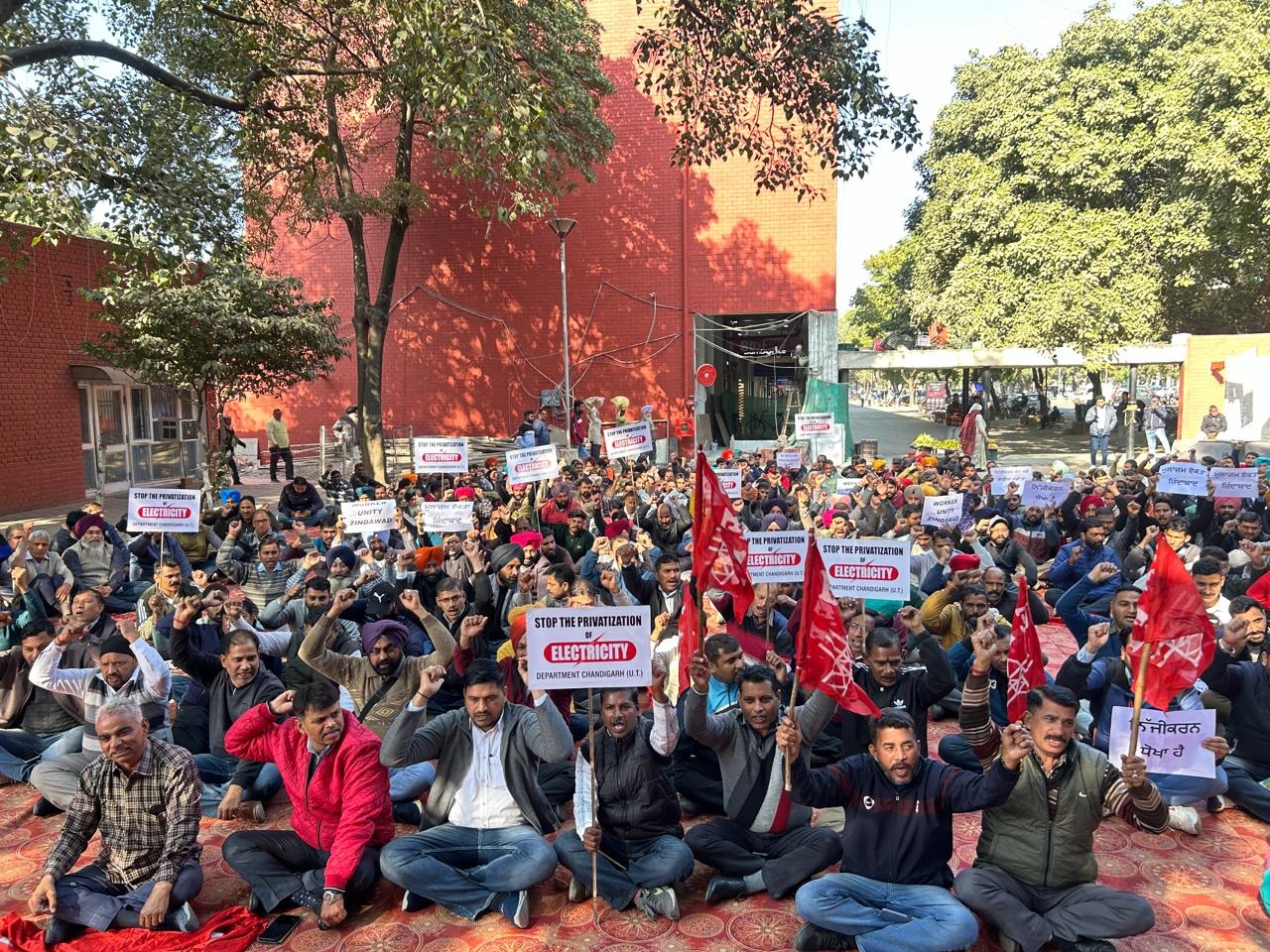
ELECTRICITY workers across India are intensifying their fight against privatisation initiatives by the Modi government, which are dismantling profitable public utilities under the guise of reforms. The Electricity Employees’ Federation of India (EEFI), in a statement issued on December 7, has pledged its unwavering support to the protests, extending nationwide solidarity to workers resisting privatisation in Chandigarh and Uttar Pradesh.
On December 6, 2024, Chandigarh electricity workers staged a massive day-long dharna in front of the Chandigarh Electricity Department headquarters. The protest defied the imposition of the draconian Essential Services Maintenance Act (ESMA), underscoring the workers’ determination. Their struggle has been ongoing for four years since the union territory administration, under directives from the Modi government, initiated the privatisation of the city’s highly profitable power department in the name of promoting Atma Nirbhar Bharat, which is ironic!
PROFITABLE PUBLIC UTILITY UNDER THREAT
Chandigarh’s Electricity Department has consistently performed as a model public utility, posting significant annual profits: Rs 365 crore in 2019-20, Rs 225 crore in 2020-21, and Rs 261 crore in 2021-22. With Aggregate Technical and Commercial (AT&C) losses below 10 per cent, it stands as a benchmark in public sector efficiency. It was a unique government-run power service that was not forcibly converted into a corporation under the Electricity Act of 2003. Its tariffs, averaging Rs 4.50 per unit, are among the lowest in the country. Additionally, the department benefits from long-term allocations of low-cost hydroelectric power from the Bhakra Beas Management Board and central sector generation stations.
Despite these strengths, the department was placed on the auction block with a questionable base price of Rs 174.63 crore. Assets, including vast tracts of prime land, were grossly undervalued, with land use allowed at a token rate of Rs 1 per month and other assets priced at Rs 1 per item under the pretext of non-availability of asset records.
EEFI and the National Coordination Committee of Electricity Employees and Engineers (NCCOEEE) have demanded an independent valuation of assets through a CAG audit and a review of financial data used in the privatisation process. However, these demands remain unmet, fuelling further discontent among workers.
The union territory administration has issued a Letter of Intention (LOI) to Eminent Electricity Limited (EEDL), a private company with no prior experience in electricity distribution. The process bypassed essential consultations with regulatory bodies like the Central Electricity Authority (CEA), Central Electricity Regulatory Commission (CERC), or Joint Electricity Regulatory Commission (JERC), as mandated by the Electricity Act, 2003. Workers and consumer rights groups fear that privatisation will lead to inflated tariffs and reduced protections for consumers.
Eminent Electricity Limited (EEDL), is a subsidiary of the Calcutta Electricity Supply Corporation (CESC). CESC is known for imposing some of the highest electricity tariffs in India, sparking concerns that Chandigarh's affordable electricity service could face steep price hikes. Moreover, reports indicate that the CESC group has made significant financial contributions to BJP funds via electoral trusts and bonds, raising questions about the motives behind the privatisation push.
RISING RESISTANCE
The Chandigarh power workers approached all the residents in Chandigarh, and in collaboration with local residents, have mounted a strong and united opposition to the privatisation move. After the sudden issuance of the LOI on November 22, 2024, the workers escalated their protests. The imposition of the Essential Services Maintenance Act (ESMA) on December 5, instead of suppressing the protests, further galvanised the workers' resolve.
Solidarity has poured in from various quarters, including government employees, farmers, and citizens, bolstering the workers' movement. Attempts by the Chandigarh UT administration to break the strike by seeking replacement workers from Punjab, Haryana, and Himachal Pradesh have backfired. Power sector unions in these states have warned their governments that any forced deployment of their workers in Chandigarh would trigger strikes within their own states.
The growing resistance has sparked unprecedented solidarity from power workers nationwide. Thousands took to the streets on December 6 and 7, 2024, demonstrating their support. To further amplify the movement, the National Coordination Committee of Electricity Employees and Engineers (NCCOEEE) has declared December 13, 2024, as National Anti-Privatization Day, with protests planned across the country.
In Chandigarh, a massive public rally is scheduled for December 25, 2024, where residents of neighbouring states will join the protest against the privatisation of the city's power department.
Similar privatisation efforts in Uttar Pradesh, targeting public DISCOMs in Agra and Varanasi, have also met with fierce resistance. The Yogi Adityanath-led government has imposed ESMA and banned public demonstrations, but power engineers and workers remain undeterred. A massive rally is planned in Lucknow on December 22, 2024, to challenge these privatisation moves.
EEFI has called on power sector employees across the country to stand in unwavering solidarity with their colleagues in Chandigarh and Uttar Pradesh. The federation also appealed to workers’ and farmers’ organisations, as well as the general public, to join the movement in large numbers.
“This fight is not just about preserving the public electricity sector,” EEFI emphasized. “It is about protecting the fundamental right to affordable electricity for all citizens and resisting the exploitation that comes with privatisation.”
The movement continues to gather momentum as workers, farmers, and citizens unite to protect public utilities from corporate profiteering.


